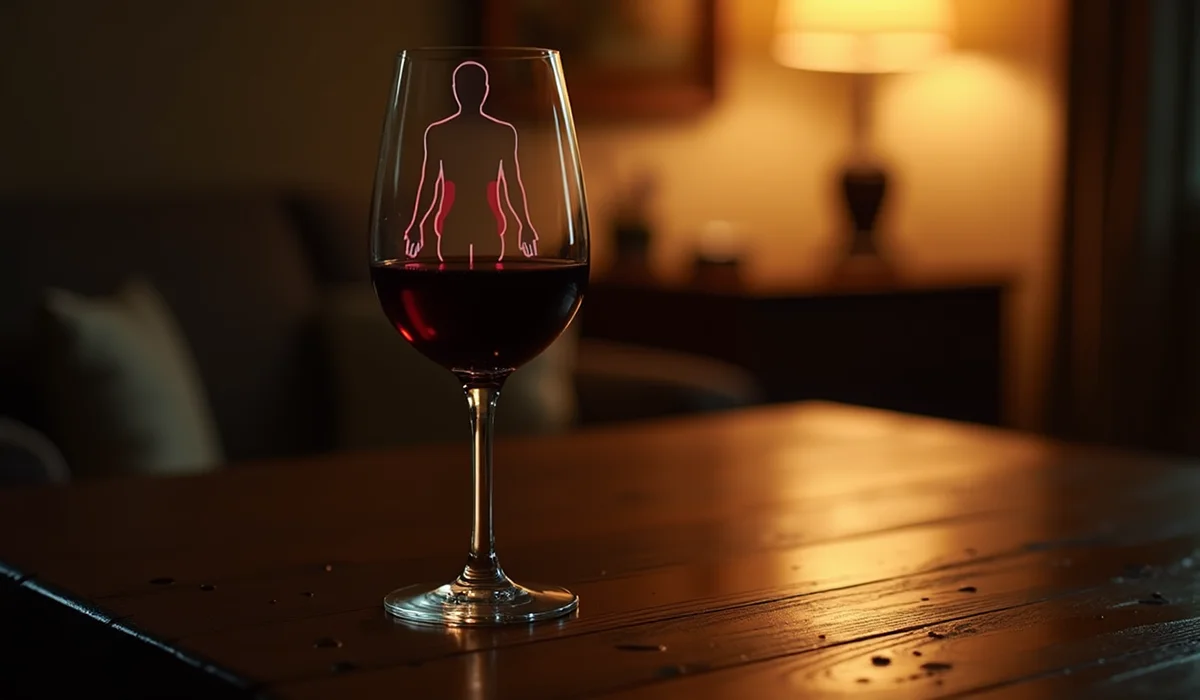Your evening glass of wine does more than help you relax. Many people keep taking alcoholic beverages, but they don’t realize how alcohol can cause inflammation. The effects are quite serious. Research proves that alcohol consumption directly links to more than 5% of all cancers.
Alcohol triggers a complex inflammatory response in our bodies that affects multiple systems. It throws off the balance of gut bacteria and makes intestinal walls more permeable. This allows harmful toxins to leak into the bloodstream. Such a process can trigger inflammation throughout the body. These changes might lead to heart disease, liver problems, and several types of cancer.
This piece will get into how alcohol sets off inflammation and affects our gut health. You’ll also learn practical ways to reduce these inflammatory responses while enjoying a drink now and then.
How Wine Triggers the Inflammatory Response
The way wine works in your body tells a troubling story that goes beyond alcohol’s immediate effects. Your liver processes wine through a two-step metabolic pathway that creates compounds. These compounds can trigger systemic inflammation throughout your body.
The conversion to acetaldehyde
Your body starts breaking down that glass of merlot right away. An enzyme called alcohol dehydrogenase (ADH) first converts ethanol into acetaldehyde—a highly toxic substance. Another enzyme, aldehyde dehydrogenase (ALDH), then turns acetaldehyde into harmless acetate. The process gets overwhelmed with higher alcohol intake, and acetaldehyde starts to build up [1].
This buildup creates serious problems because acetaldehyde can cause cancer. It reacts with DNA to create cancer-promoting compounds [1]. Red wine makes this worse because it has high levels of quercetin. This substance can block the ALDH2 enzyme with an IC50 of 9.6 µM, which lets more acetaldehyde accumulate [1].
Oxidative stress and free radical production
Alcohol doesn’t just create acetaldehyde—it gets more reactive oxygen species (ROS) through several processes. The breakdown of alcohol changes the NAD+/NADH ratio in cells, which encourages more ROS formation [2]. It also gets cytochrome P450 enzymes going, especially CYP2E1, which adds by a lot to ROS production [2].
These free radicals attack cells in different ways. They speed up aging and can destroy cells completely [3]. This oxidative stress damages lipids, proteins, and DNA through peroxidation [2]. Wine has polyphenols that act as antioxidants, but if you keep taking alcohol, it ended up increasing oxidative damage markers like 8-iso-PGF2α [4].
Your body’s defensive reaction
Your immune system fights back against these attacks with inflammation. Many people’s bodies show this through facial flushing, headaches, or stuffy noses—especially when you have red wine [5]. Red wine naturally has lots of histamine and can stop diamine oxidase (DAO), your body’s enzyme that breaks down histamine [6].
Regular drinking can raise inflammatory markers throughout your body. Alcohol’s oxidative stress activates immune cells and triggers inflammatory pathways linked to endothelial activation [7]. Some studies suggest moderate wine drinking might fight inflammation because of its polyphenols [7], but the inflammatory response from regular drinking usually outweighs these benefits.
This biochemical chain reaction explains why your evening glass of wine might trigger inflammation throughout your body even days after you drink it.
The Gut-Inflammation Connection
Your gut does more than digest food—it’s a complex ecosystem where trillions of microorganisms shape your health. That nightly glass of cabernet might disrupt this delicate balance.
How wine disrupts gut bacteria balance
Regular alcohol consumption changes your gut microbiota makeup. Research shows alcoholics have fewer beneficial Bacteroidetes and higher levels of harmful Proteobacteria [8]. Alcohol leads to both dysbiosis (microbial imbalance) and excess bacterial growth in the small intestine [9].
The disruption follows a clear pattern. Alcohol reduces helpful bacteria like Akkermansia, Roseburia, Faecalibacterium, and Bacteroides. It also lowers the production of butyrate, a key compound that keeps your intestines balanced [9]. These changes weaken your gut’s natural defense against inflammation.
Leaky gut syndrome and alcohol
Your intestinal barrier acts as a gatekeeper for your bloodstream, but alcohol damages this protection. A single drinking binge can let bacteria leak from the gut and raise blood levels of bacterial toxins (endotoxins) [10].
Alcohol damages your gut in several ways. It kills cells directly and causes mucosal erosions [11]. It creates DNA adducts through acetaldehyde [11] and breaks down tight junctions between intestinal cells [11]. People with alcohol use disorder who developed leaky gut showed higher levels of depression, anxiety, and alcohol craving. These symptoms lasted even after three weeks without drinking [12].
The pathway from gut to systemic inflammation
A compromised gut barrier lets bacterial components—mainly lipopolysaccharides (LPS) from gram-negative bacteria—escape into your blood [13]. These gut-derived bacterial products trigger immune cells throughout your body. This releases inflammatory cytokines like TNF-α, IL-1β, IL-6, and IL-8 [13].
The inflammation spreads beyond your gut. Circulating cytokines reach your central nervous system and cause neuroinflammation. This affects your mood, thinking, and drinking behavior [14]. Research shows that inflammatory cytokines relate to depression, anxiety, and alcohol craving in alcoholics [14]. This creates a direct link between gut inflammation and mental health.
From One Glass to Body-Wide Effects
A single glass of alcohol triggers a measurable inflammatory response in your bloodstream. Scientists have discovered a complex connection between your drink choices and your body’s cellular reactions.
Immediate inflammatory markers after drinking
Your blood shows higher inflammatory markers soon after you drink alcohol. Alcohol enters your bloodstream faster, and studies show plasma LPS (bacterial toxins) increases five times within 30-90 minutes of drinking [11]. The inflammatory response creates a U-shaped curve, especially for interleukin-6 (IL-6) and C-reactive protein (CRP) – two key inflammation indicators [15]. Men and women react differently. Women’s inflammatory markers follow a J-shaped curve, while men show a steady increase [16].
How inflammation spreads throughout your body
Inflammation doesn’t stay in one place after it starts. Your compromised gut barrier lets bacterial endotoxins escape into circulation and creates a chain reaction. These toxins activate your immune cells everywhere, which release inflammatory compounds that travel through blood to other organs [17].
Your liver should filter these toxins but becomes overwhelmed when you drink repeatedly. This allows more inflammatory molecules to spread throughout your body [17]. The inflammation reaches beyond your liver to affect your brain, heart, joints, and respiratory system [1]. This explains why people who drink heavily often have joint pain, thinking problems, and catch more respiratory infections [18].
Why evening consumption may be worse
Your nighttime wine could be extra harmful. Research shows alcohol at night interferes with your body’s natural healing process [19]. A single drink stresses your body and activates your hypothalamic-pituitary-adrenal (HPA) axis, which raises cortisol levels [17].
Drinking at night disrupts your sleep quality and makes it harder for your body to control inflammation [1]. On top of that, it keeps alcohol in your system when your gut naturally becomes more permeable, which can increase the escape of inflammatory compounds [11]. These factors combine to create stronger body-wide effects that last long after you finish your drink.
Breaking the Wine-Inflammation Cycle
You might think cutting out wine is the best way to avoid inflammation, but most of us still want to enjoy a glass now and then. The good news? Research shows several ways to reduce your evening cabernet’s effects on inflammation.
Anti-inflammatory foods to pair with wine
The right food choices can offset wine’s inflammatory effects by a lot. Your best bet? Load up on foods rich in antioxidants. A Mediterranean diet with plenty of fruits, vegetables, lean proteins, and healthy fats gives your body everything it needs to recover [20].
Bright-colored berries and citrus fruits pack vitamin C that fights free radicals [18]. Foods like salmon, nuts, and leafy greens work especially well to fight alcohol-related inflammation [20].
Here’s a quick tip: Add some pomegranate seeds or berries to your wine glass for an antioxidant boost [21]. Your body will thank you if you eat about 10 servings of colorful fruits and vegetables each day. This helps eliminate toxins and their harmful effects [4].
Timing strategies to minimize inflammatory effects
The timing of your wine matters just as much as what you eat with it. Food in your stomach is vital because it slows down how quickly alcohol enters your bloodstream [4]. Less alcohol absorption means less inflammation.
Intermittent fasting might help too. Try this: Stop eating 2-4 hours before bed and wait 2-4 hours after waking to eat breakfast [4]. This extended fasting period helps lower your body’s inflammation levels.
Eating anti-inflammatory foods before drinking can prepare your system better. Your bedtime matters too – alcohol disrupts sleep, which is your body’s natural way to fight inflammation [4].
Hydration and supplements that help
Water plays a key role in managing alcohol-induced inflammation. Follow this simple rule: Drink an 8-ounce glass of water after each alcoholic drink to flush out toxins [18]. This helps rehydrate tissues that alcohol affects.
Supplements can make a difference too. Resveratrol (150-500mg per serving) helps control inflammation through a protein that acts like a brake pedal on inflammatory pathways [22]. Other helpful options include vitamin D, vitamin C, NAC, curcumin, milk thistle, and green tea extract. These activate Nrf2, which helps regulate inflammatory responses [4].
Quality sleep (7-9 hours each night) and stress-busting activities like yoga and meditation also help keep inflammation in check [20].
Conclusion
New research about wine’s inflammatory effects changes our perspective on that evening glass of cabernet. Science shows alcohol’s effects go way beyond temporary intoxication and trigger complex inflammatory responses throughout the body.
The way our bodies handle alcohol depends on timing, food pairings, and lifestyle choices. You can minimize negative effects with smart strategies. Eating anti-inflammatory foods, staying hydrated, and avoiding drinks close to bedtime makes a difference. Your body’s natural defense mechanisms against inflammation get support from supplements like resveratrol and vitamin D.
You don’t need to give up wine completely. Make smart choices about your drinking habits. Better nutrition, enough sleep, and mindful consumption help manage alcohol’s effects on your body. Listen to your body’s signals and adjust your habits accordingly to find the sweet spot between enjoying wine and staying healthy.
References
[1] – https://riahealth.com/blog/alcohol-and-inflammation/
[2] – https://pmc.ncbi.nlm.nih.gov/articles/PMC6668865/
[3] – https://www.sciencedirect.com/science/article/abs/pii/S0963996999000939
[4] – https://honehealth.com/edge/does-alcohol-cause-inflammation/?srsltid=AfmBOorgcnrY6YGmHVwa5vJu6mFc8wy3YbrBLOWzyarnyvNncnDNyY8w
[5] – https://www.healthline.com/health/wine-allergens
[6] – https://www.texashealth.org/areyouawellbeing/Allergies/What-You-Need-to-Know-About-Alcohol-and-Allergies
[7] – https://www.sciencedirect.com/science/article/pii/S0002916523276698
[8] – https://pmc.ncbi.nlm.nih.gov/articles/PMC4590619/
[9] – https://www.tinyhealth.com/blog/drinking-alcohol-gut-health-does-alcohol-kill-gut-bacteria
[10] – https://www.nih.gov/news-events/news-releases/single-episode-binge-drinking-linked-gut-leakage-immune-system-effects
[11] – https://pmc.ncbi.nlm.nih.gov/articles/PMC5513683/
[12] – https://www.pnas.org/doi/10.1073/pnas.1415174111
[13] – https://www.frontiersin.org/journals/microbiology/articles/10.3389/fmicb.2022.916765/full
[14] – https://www.nature.com/articles/tp201715
[15] – https://www.ahajournals.org/doi/10.1161/01.cir.0000109503.13955.00
[16] – https://academic.oup.com/alcalc/article/45/2/119/135134
[17] – https://pmc.ncbi.nlm.nih.gov/articles/PMC2842521/
[18] – https://joinmonument.com/resources/alcohol-inflammation-causes-explained/
[19] – https://www.health.com/does-alcohol-cause-inflammation-8763005
[20] – https://www.eatingwell.com/alcohol-and-inflammation-8415778
[21] – https://drwillcole.com/food/alcohol-consumption-inflammation
[22] – https://news.gsu.edu/2016/09/28/component-red-wine-grapes-can-help-reduce-inflammation-georgia-state-researchers-find/








